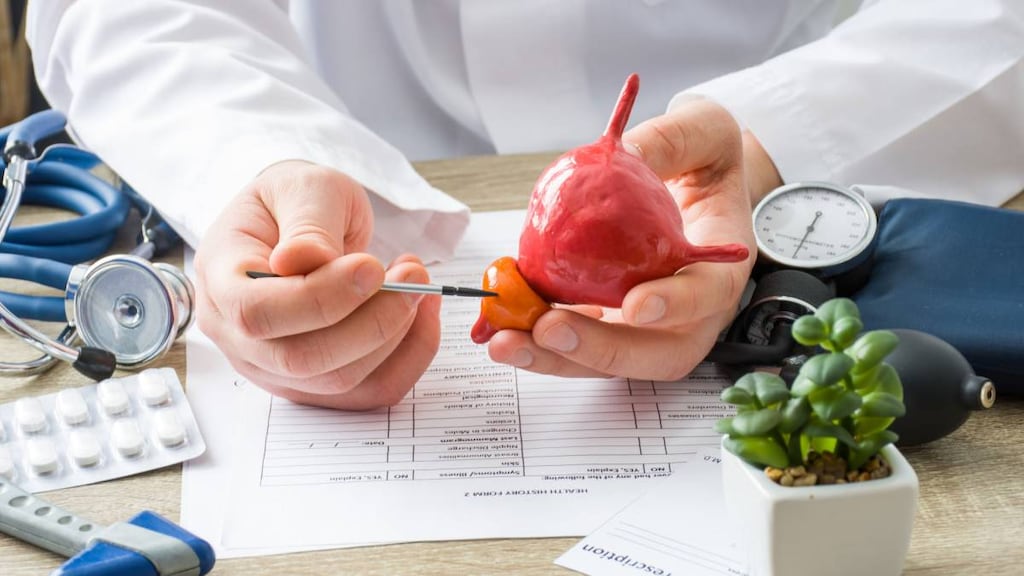What is Uroxatral?
Uroxatral is a prescription medicine that is called an "alpha-blocker". Uroxatral is used in adult men to treat the symptoms of benign prostatic hyperplasia (BPH). Uroxatral may help to relax the muscles in the prostate and the bladder which may lessen the symptoms of BPH and improve urine flow.
Before prescribing Uroxatral, your doctor may examine your prostate gland and do a blood test called a prostate specific antigen (PSA) test to check for prostate cancer. Prostate cancer and BPH can cause the same symptoms. Prostate cancer needs a different treatment.
Uroxatral is not for use in women or children.
Some medicines called "alpha-blockers" are used to treat high blood pressure. Uroxatral is not for the treatment of high blood pressure.
What is the most important information I should know about Uroxatral?
Uroxatral can cause serious side effects, including a sudden drop in blood pressure, especially when you start treatment. This may cause you to faint, or to feel dizzy or lightheaded.
- Your risk of having this problem may be increased if you take Uroxatral with certain other medicine that lowers blood pressure:
- medicines for high blood pressure
- a nitrate medicine for angina
- Do not drive, operate machinery, or do any dangerous activities until you know how Uroxatral affects you. This is especially important if you already have a problem with low blood pressure or take medicines to treat high blood pressure.
- If you begin to feel dizzy or lightheaded, lie down with your legs and feet up. If your symptoms do not improve call your doctor.
See the section "What are the possible side effects of Uroxatral?" for more information about side effects.
Who should not take Uroxatral?
Do not take Uroxatral if you:
- have certain liver problems
- take antifungal medicines like ketoconazole or itraconazole (Sporanox)
- take anti-HIV medicines like ritonavir (Norvir, Kaletra)
- are allergic to alfuzosin hydrochloride or any of the ingredients in Uroxatral.
See the end of this leaflet for a complete list of ingredients in Uroxatral.
What should I tell my healthcare provider before taking Uroxatral?
Before taking Uroxatral, tell your doctor if you:
- have liver problems
- have kidney problems
- have had low blood pressure, especially after taking another medicine. Signs of low blood pressure are fainting, dizziness, and lightheadedness.
- have a heart problem called angina
- or any family members have a rare heart condition known as congenital prolongation of the QT interval.
Tell your doctor about all the medicines you take, including prescription and non-prescription medicines, vitamins and herbal supplements. Some of your other medicines may affect the way Uroxatral works and cause serious side effects. See "What is the most important information I should know about Uroxatral?"
Especially tell your doctor if you take:
- another alpha blocker medicine
- a medicine to treat high blood pressure
- a medicine to treat angina
- a medicine to treat erectile dysfunction (ED)
- the antifungal medicines like ketoconazole or itraconazole (Sporanox)
- the anti-HIV medicine like ritonavir (Norvir, Kaletra)
Ask your doctor or pharmacist if you are not sure if your medicine is one of those listed above.
What you need to know while taking Uroxatral (alfuzosin HCl) tablets
- If you have an eye surgery for cataract (clouding of the eye) planned, tell your ophthalmologist that you are using Uroxatral or have previously been treated with an alpha-blocker.
How should I take Uroxatral?
- Uroxatral comes in child-resistant package.
- Take Uroxatral exactly as your doctor prescribes it.
- Take Uroxatral after the same meal each day. Do not take it on an empty stomach.
- Swallow the Uroxatral tablet whole. Do not crush, split, or chew Uroxatral tablets.
- If you take too much Uroxatral call your local poison control center or emergency room right away.
What are the possible side effects of Uroxatral?
Uroxatral can cause serious side effects, including:
- See "What is the most important information I should know about Uroxatral?"
- A painful erection that will not go away. Uroxatral can cause a painful erection (priapism), which cannot be relieved by having sex. If this happens, get medical help right away. If priapism is not treated, you may not be able to get an erection in the future.
The most common side effects with Uroxatral are:
- dizziness
- headache
- tiredness
Call your doctor if you get any side effect that bothers you.
These are not all the side effects of Uroxatral. For more information ask your doctor or pharmacist.
Call your doctor for medical advice about side effects. You may report side effects to FDA at 1-800-FDA-1088.
General information about the safe and effective use of Uroxatral
Medicines are sometimes prescribed for conditions that are not mentioned in patient information leaflets. Do not use Uroxatral for a condition for which it was not prescribed. Do not give Uroxatral to other people, even if they have the same symptoms you have. It may harm them.
This leaflet summarizes the most important information about Uroxatral. If you would like more information, talk with your doctor. You can ask your doctor or pharmacist for information about Uroxatral that is written for health professionals.
How should I store Uroxatral?
- Store Uroxatral between 59°F and 86°F (15°C and 30°C).
- Protect from light and moisture.
Keep Uroxatral and all medicines out of the reach of children.
What are the ingredients in Uroxatral?
Active Ingredient: alfuzosin hydrochloride
Inactive Ingredients: colloidal silicon dioxide (NF), ethylcellulose (NF), hydrogenated castor oil (NF), hydroxypropyl methylcellulose (USP), magnesium stearate (NF), mannitol (USP), microcrystalline cellulose (NF), povidone (USP), and yellow ferric oxide (NF).

